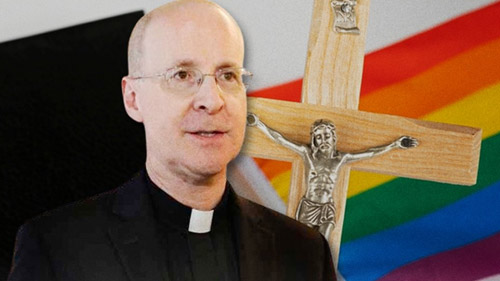| Recent Featured Videos and Articles | Eastern “Orthodoxy” Refuted | How To Avoid Sin | The Antichrist Identified! | What Fake Christians Get Wrong About Ephesians | Why So Many Can't Believe | “Magicians” Prove A Spiritual World Exists | Amazing Evidence For God | News Links |
| Vatican II “Catholic” Church Exposed | Steps To Convert | Outside The Church There Is No Salvation | E-Exchanges | The Holy Rosary | Padre Pio | Traditional Catholic Issues And Groups | Help Save Souls: Donate |  |









 " />
" /> " />
" /> " />
" /> " />
" /> " />
" />




St. Gregory Nazianzen Rejected "Baptism of Desire"
Bro. Peter Dimond
As we discussed in our book Outside The Catholic Church There Is Absolutely No Salvation, St. Gregory Nazianzen, 4th century Father and Doctor of the Church, explicitly rejected the concept of “baptism of desire” in his Oration on Holy Baptism, dated January 6, 381. Below is an extended passage from nos. 22-24 of that oration. I will place in bold and comment on the most important statements.
First, notice that St. Gregory rejects the notion that God will take the “desire of baptism instead of baptism”, that one who is “unenlightened” (i.e. unbaptized) can be “enlightened in His sight”, and that “he is within the Kingdom of Heaven who merely desires to attain it” (#22). As any honest person will recognize, this is an explicit, crystal clear rejection of the concept of ‘baptism of desire’. What’s remarkable is that in the face of such a direct statement denying the idea of ‘baptism of desire’, many defenders of 'baptism of desire' will still argue that St. Gregory Nazianzen did not reject it! Their dishonesty is astounding. Their failure to concede even the most obvious facts against their position proves that the truth is not in them.
For example, in the heretical book Is Feeneyism Catholic?, Fr. Francois Laisney of the SSPX actually stated the following concerning the aforementioned passage of St. Gregory Nazianzen:
Another defender of ‘baptism of desire’, whom we’ve refuted, stated: “St. Gregory Nazianzen was clearly not rejecting the doctrine of Baptism of Desire in his explanation…” Demonic is the appropriate word to describe such a brazen falsification of the truth. There’s a reason they obstinately adhere to ‘baptism of desire’: they simply don't want the truth. Laisney also infamously stated that the Council of Florence “mentions” “baptism of desire” (another total lie). Our book thoroughly exposes his diabolical work.
If the aforementioned passages from St. Gregory were not sufficient to prove that he rejected ‘baptism of desire’ (and they are), in #23 he goes further. St. Gregory proceeds to reject that one can “reckon as baptized him who desired baptism apart from the reception of baptism”, and that “desire… has equal power with actual baptism”. That is another clear repudiation of the concept of ‘baptism of desire’.
It’s true that Gregory also teaches that infants and those above reason, who want baptism but are prevented from receiving it through “some perfectly involuntary circumstance”, will “be neither glorified nor punished by the righteous Judge, as unsealed and yet not wicked.” This statement constitutes another rejection of ‘baptism of desire’, for it asserts that catechumens, etc. who wish for baptism, but are prevented from receiving it, will not be glorified. However, his assertion that those who wish for baptism, but are involuntarily prevented from receiving it, will not be punished, and will end up with unbaptized infants, is not correct. Their sins can only be forgiven in baptism. Therefore, they could not be freed from mortal sin without baptism; and all who die in mortal sin go to the fires of Hell to be punished (de fide definita). Furthermore, God is in control. He is all-powerful and merciful. Those who sincerely seek what He offers will find it (Luke 11:10). If God allows such a person to die without water baptism, it’s because He didn’t deem that person to be of good will or worthy of baptism. As St. Augustine taught:
So, St. Gregory’s explanation in that regard was not correct. However, even in that part of the passage he upholds the apostolic teaching that no one can enter the Kingdom of Heaven without water baptism (John 3:5), and again repudiates the false doctrine of ‘baptism of desire’, by asserting that those who die wishing for baptism cannot be “glorified” or "honored”, having been “unsealed” (i.e. unbaptized).
SUMMARY OF ST. GREGORY NAZIANZEN’S TEACHING AGAINST ‘BAPTISM OF DESIRE’
Thus, the doctor of the Church St. Gregory Nazianzen affirmed the apostolic truth that no one enters Heaven without baptism while directly rejecting the following:
These bullet points capture St. Gregory Nazianzen’s rejection of the idea of ‘baptism of desire’. It is remarkable that in the face of these facts there are actually supporters of ‘baptism of desire’ who say that 1) the fathers of the Church unanimously taught ‘baptism of desire’ (a lie), and 2) St. Gregory Nazianzen didn’t reject ‘baptism of desire’ (a lie).
ALSO BEWARE OF THOSE WHO MISREPRESENT AND MISQUOTE ST. GREGORY NAZIANZEN ON ‘BAPTISM OF BLOOD’
Since St. Gregory clearly rejected ‘baptism of desire’, if he believed that martyrdom or anything else could replace water baptism one would expect him to have mentioned that when rejecting that one who is “unenlightened” (i.e. unbaptized) can be “enlightened in His sight” and that “desire… has equal power with actual baptism”. But he doesn’t mention that ‘martyrdom’ or ‘blood’ or anything else can replace water baptism.
Some, however, misquote his Oration 39 on the Holy Lights, in which he speaks metaphorically of more than five kinds of ‘baptism’. In that Oration Gregory refers to the baptism of Moses, of John, of Christ, of martyrdom or blood, and of tears. Numerous fathers of the Church referred to a martyrdom of an already baptized Catholic as a 'baptism of blood'. That doesn’t prove that those individuals believed it could take the place of baptism. There is nothing in St. Gregory’s discussion about a "fourth baptism – by martyrdom and blood" that indicates that he believed it could replace water baptism in the Christian era. He does not make any such statement. Yet, the dishonest defenders of BOD will frequently present him as having endorsed such a position. That is typical of their perfidy and falsification of texts. In fact, his Oration on the Holy Lights was intended, at least in part, to refute the Novatians who denied absolution for certain kinds of sins after baptism. Novatian denied absolution for idolatry; his followers extended that to murder, adultery, and fornication. In that context, Gregory mentions a "baptism of tears" as a "fifth" baptism, and he says: “I, however, for I confess myself to be a man… both eagerly receive this Baptism and Worship Him who has given it to me…” St. Gregory, of course, had already received water baptism; yet, he says that he eagerly receives this "baptism" of "tears". That proves that the ‘baptism of tears’ refers to an already-baptized person expiating or washing away the stains of sin through prayers, spiritual works, and penitential acts. It does not in any way teach that ‘tears’ or penance can be a substitute for water baptism. In the same way, the Council of Trent noted that the fathers called Penance “a laborious kind of baptism”, because Baptism remits the temporal punishment by the power of the sacramental grace, but those who have been baptized frequently can only receive the remission of the temporal punishment required for certain sins through good works, labor, enduring suffering or tears.
This has nothing to do with tears or penance serving as a substitute for water baptism. Moreover, notice that when St. Gregory mentions a "fourth baptism – by martyrdom and blood" and a "fifth" of tears, he says the following in #19. This comes in the paragraph immediately after the discussion of a 'baptism of tears'. He says: "But these sins were not after Baptism, you will say. Where is your proof? Either prove it— or refrain from condemning; and if there be any doubt, let charity prevail. But Novatus, you say, would not receive those who lapsed in the persecution."
Notice the explicit reference to the position of Novatus, who denied forgiveness for certain sins after baptism. (Novatian's name is given as Novatus by Greek writers.) Further, notice that he's interacting with the argument of those who deny the forgiveness of certain sins after baptism. Thus, Gregory is discussing the various ways in which sins can be forgiven or washed away after baptism; he nowhere says that anything can serve as a substitute for water baptism. This is further confirmed by how Gregory concludes his Oration on the Holy Lights. He makes reference to a sixth 'baptism', of fire, which consumes the stubble of every evil and is "painful and longer" (#20). This refers to a purging fire or 'baptism' --- which again happens after water baptism. He's using the term 'baptism' metaphorically to describe the various ways in which sin can be washed away after baptism to refute the false teaching of the Novatians who denied forgiveness for certain sins committed after baptism.
So, there’s no proof that St. Gregory taught that martyrdom could replace water baptism, despite what the typically dishonest defenders of ‘baptism of desire’ and ‘blood’ assert. The fact is that there is zero support for the false teaching of ‘baptism of blood’ in the papal magisterium, and the idea is refuted by the Church’s infallible teaching that no one can be saved without the Sacrament of Baptism.
STATEMENTS ABOUT THE AUTHORITY OF ST. GREGORY NAZIANZEN DEMOLISH A POPULAR ARGUMENT
The fact that St. Gregory Nazianzen explicitly rejected ‘baptism of desire’ demolishes a popular argument made by supporters of BOD. The reality is that the early Church rejected ‘baptism of desire’ in many statements, as Pope St. Siricius’ teaching in the oldest surviving papal decree and many other statements show: The Latin Text of the Oldest Surviving Papal Decree Rejects “Baptism of Desire”. However, supporters of ‘baptism of desire’ like to bring up the authority of St. Thomas or the Breviary or theologians. Well, all of those sources refute their position.
THE BREVIARY ON ST. GREGORY NAZIANZEN’S AUTHORITY
The Roman Breviary says this for May 9th concerning St. Gregory Nazianzen:
St. Gregory Nazianzen rejected baptism of desire, and the Breviary says that there is nothing in his writings which is not conformable to the Catholic religion or which one could call into question. If one considers the Breviary to be infallible on theological matters, he would have to reject 'baptism of desire'.
GREGORY WAS SURNAMED “THE THEOLOGIAN”
St. Gregory Nazianzen is also one of the only doctors in Church history who was given the special title of ‘Theologian’. Dom Prosper Guéranger noted:
So, the one who is surnamed 'the theologian' explicitly rejected ‘baptism of desire’! The truth is that the theologians are actually unanimous that no one is saved without baptism based on John 3:5, even though they didn’t always remain consistent with the universal apostolic affirmation.
In the Summa Theologiae, St. Thomas Aquinas says this about St. Gregory Nazianzen.
If one were to strictly follow and apply the teaching of St. Thomas, one would have to reject ‘baptism of desire’, since St. Gregory did. The truth is that neither St. Gregory Nazianzen nor St. Thomas was infallible. However, these facts demonstrate that any argument advanced by supporters of BOD actually serves to refute their position and illuminate the true teaching of the Church: that no one can be saved without water baptism.
ST. GREGORY NAZIANZEN PRESIDED OVER THE COUNCIL OF CONSTANTINOPLE IN 381, WHICH DECLARED “ONE BAPTISM FOR THE REMISSION OF SINS”
St. Gregory Nazianzen was the Bishop of Constantinople for a period of time in the 4th century. He played a notable role at the First Council of Constantinople in the year 381. Gregory succeeded Meletius as president of the Council of Constantinople. He presided for some time, but then resigned his position due to ill health and disappointments over a dispute about the successor at Antioch. The Catholic Encyclopedia notes: “He [St. Gregory] appeared again before the council, intimated that he was ready to be another Jonas to pacify the troubled waves, and that all he desired was rest from his labours, and leisure to prepare for death. The Fathers made no protest against this announcement, which some among them doubtless heard with secret satisfaction; and Gregory at once sought and obtained from the emperor permission to resign his see. In June, 381, he preached a farewell sermon before the council and in presence of an overflowing congregation. The peroration of this discourse is of singular and touching beauty, and unsurpassed even among his many eloquent orations.”
ST. GREGORY'S KEY ROLE AT THE FIRST COUNCIL OF CONSTANTINOPLE, IN CONJUNCTION WITH HIS EXPLICIT REPUDIATION OF 'BAPTISM OF DESIRE' IN THE SAME YEAR, SHEDS IMPORTANT LIGHT ON THE COUNCIL'S DECLARATION: "ONE BAPTISM FOR THE REMISSION OF SINS"
Even though Gregory did not finish the Council as its president or as the Bishop of Constantinople, he had served as both during the Council. He was a key figure there who is now a saint and doctor of the Church. The First Council of Constantinople is now recognized as the second ecumenical council. In the same year it was held, 381 – indeed, just a few months before it – St. Gregory Nazianzen gave his Oration on Holy Baptism, which is examined above. St. Gregory’s teaching in that Oration thus reflects what true Christians and the fathers at the time of the First Council of Constantinople believed and taught. This is extremely interesting because the First Council of Constantinople in 381 is where we find the first dogmatic pronouncement of the truth that there's only one baptism for the remission of sins.
This dogmatic truth refutes ‘baptism of desire’, for the one baptism for the remission of sins is celebrated in water (Pope Clement V, Council of Vienne, 1311-1312). The Nicene Creed recited at Traditional Masses is actually the Nicene-Constantinople Creed. The Creed proclaimed in 325 at the Council of Nicea was shorter than what is recited at the Traditional Mass and what was proclaimed at Constantinople in 381. Constantinople amplified or expanded the Creed. It added professions about the Holy Ghost, the Catholic Church, the resurrection of the dead, and the phrase “one baptism for the remission of sins”. Moreover, after the First Council of Constantinople, we know that the Filioque clause (meaning: “and the Son”), which states that Holy Ghost proceeds from the Father and the Son, was added to what is called the Nicene Creed. But the famous dogmatic proclamation that there is “one baptism for the remission of sins” was first made at Constantinople in 381.
Well, we often hear from ‘baptism of desire’ defenders that a Catholic’s understanding of these issues should be derived from the 'mind of the theologians', rather than from the actual text of the dogmatic pronouncements. That is clearly wrong. The pronouncements of the Magisterium are the rule of faith. However, if one were to adopt the methodology proposed by supporters of BOD, it would again refute ‘baptism of desire’. For just consider the teaching of the man who presided over the very council which proclaimed “one baptism for the remission of sins.” In the very same year he rejected the idea that God will take the “desire of baptism instead of baptism”, that “desire… has equal power with actual baptism”, that “he is within the Kingdom of Heaven who merely desires to attain it”, etc. He did not believe that “desire” could replace, be equated with, or constitute water baptism. So, if we assume that his teaching represents the ‘sense’ or 'mind' of Constantinople’s decree on “one baptism”, we must conclude that “one baptism for the remission of sins” excludes ‘baptism of desire’!
This is just another illustration that we who believe and profess that no one can be saved without water baptism have the truth and affirm Catholic teaching. Those who deny it and obstinately adhere to the false doctrine of ‘baptism of desire’ don’t.
APPENDIX- OTHER MAGISTERIAL/DOGMATIC DECREES AND FACTS ON THE CHURCH’S TEACHING ON BAPTISM
Sign up for our free e-mail list to see future vaticancatholic.com videos and articles.
Recent Content
^